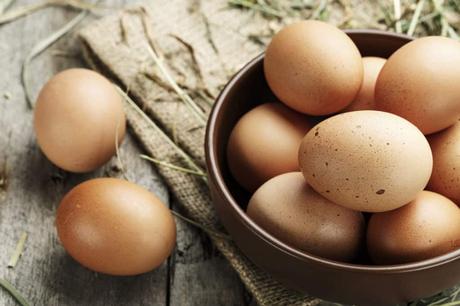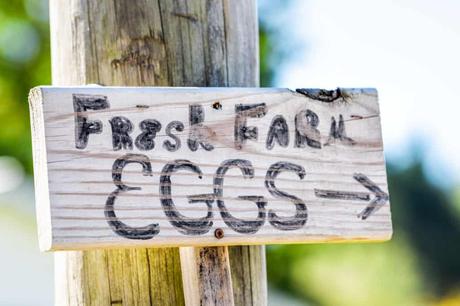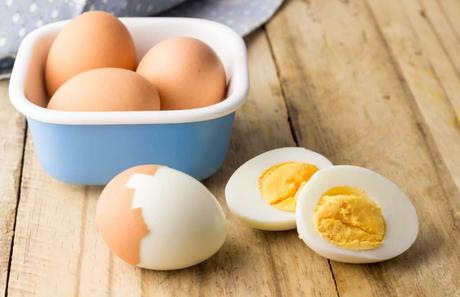This post may contain affiliate links. As an Amazon Associate, I earn from qualifying purchases. Please read my disclosure.
Farm fresh eggs are wonderfully delicious to enjoy for breakfast - it's one of the best parts about living near a farm or keeping chickens yourself! But if you regularly enjoy fresh eggs vs. grocery store eggs, you might be wondering the best way to store them. So what is the best way to store fresh eggs? How long do farm fresh eggs last? Read on to learn everything you need to know storing fresh eggs, how to tell when an egg is bad, and more!
Keeping laying chickens or buying farm fresh eggs from small farms is becoming more popular these days! Whether you have your own backyard chicken eggs, or simply enjoy visiting your local farmers' markets, you might have noticed that hobby farms, roadside stands, and community egg vendors have also become more common in suburban, rural, and urban areas!
Choosing eggs from chickens that have been raised naturally is a more ethical and environmentally friendly option. Caged chickens from non organic farms are often kept indoors and fed an unnatural diet of corn, soy, high fructose corn syrup, and cottonseed. Whereas chickens raised naturally (or free-range chickens) have access to fields where they can forage for food.
Ask farmers how they raise their chickens and what they eat at your local farmers' market to find the best quality eggs. But if you have lots of eggs, what should you do with them?
In this post, I am going to help you answer some of the most common questions you may have asked yourself about fresh farm eggs, such as "how long do fresh eggs last in the fridge?" and "how long do eggs stay fresh?"
So let's dive in and learn everything you need to know about storing and keeping farm fresh eggs!
How Long Are Fresh Eggs Good For? How Long Do Farm Fresh Eggs Last?
How long do chicken eggs last? This is a very common question that many people wonder about! How long farm eggs last will depend on how you store them, such as on the kitchen counter or in the back of the fridge.
Unwashed, freshly laid eggs can be kept at room temperature for at least 2 weeks and up to a month before being refrigerated. It's recommended to eat farm-fresh eggs within two weeks because they taste better, but you'll be fine if you eat the egg within one month of its laying.
If you don't plan to finish them within a month, you can move them to the fridge where they will last for up to 3 months.
How To Store Farm Fresh Eggs
Freshly laid eggs can be left out at room temperature for at least a month before needing to be moved into the refrigerator. Before they ever reach the shelves, commercial eggs purchased at a store are usually at least a month old and have a shorter shelf life!
What To Do When You Bring Eggs Home From The Farm
Whether you get your eggs from a friend or family member who has a backyard flock or from a farmers' market, there are a few different ways to treat your eggs when you bring them home.
If your farm fresh chicken eggs are unwashed when you get them, their bloom or cuticle protects the shell from bacteria. For this reason, they can be safely stored on the kitchen counter at room temperature. If your eggs are unwashed, it's best to store them in a basket with some straw or some hay at room temperature.
But if your eggs have already been washed, you'll want to keep them refrigerated to keep them fresh and flavorful.
What Is The Egg Bloom?
The protective bloom is the outermost layer of an egg's shell, applied last before the hen lays the egg. It's possible you may have heard it referred to as the cuticle. In a nutshell, it's a protein-rich foamy layer that surrounds the egg.
This protective coating is the egg's first line of defense against air and bacteria. Because the egg shell has a porous shell, washing your eggs immediately after collecting them removes that natural barrier.
The protective layer bloom helps prevent bacteria from entering the egg white via the shell. It also helps keep the egg fresher for longer by limiting the flow of air through the eggshell pores.
Commercial egg producers spray the eggs with a chemical sanitizer before packaging them to decrease the possibility of bacteria like salmonella contaminating the egg. The eggs are then washed, and the bloom is removed, leaving the egg pores accessible to new bacteria.
Should You Wash Your Farm Fresh Eggs?
It's really not necessary to wash your chicken eggs when you bring them home from the farm (or from your backyard coop!) As mentioned, washing eggs removes the protective membrane so they will have to be refrigerated immediately. If your eggs are really dirty and you need to clean them, you can dab it with a cloth to preserve the egg bloom (and then you can still store it at room temperature).
How Long Do Unwashed Eggs Last?
If you're wondering how long farm fresh eggs last unwashed, then I have the answer for you! Unwashed eggs can be gathered and stored on your kitchen counter for 2-4 weeks at room temperature, where they will remain as edible, if not as fresh, as when they were laid. I recommend storing them in an egg skelter where you can keep them organized - egg skelters allow you to eat the oldest eggs first and keep track of which eggs were laid when!
How To Keep Eggs Fresh
When it comes to fresh egg storage, you can store the room temperature eggs in any dish, such as an egg skelter, but if you want them to stay 'fresher,' place them in an egg carton.
Eggs should be put in the refrigerator's main body rather than in the refrigerator door to maintain a cool and consistent temperature.
Raw yolks and egg whites should be stored in airtight containers in the refrigerator as soon as possible. Cover the yolks with a bit of cool water to keep them from drying out. Before usage, drain the water.
When storing hard-boiled eggs in the refrigerator, you may detect a "gassy" unpleasant odor. Hydrogen sulphide, which is formed when eggs are cooked, is the source of the odor. It's completely harmless and usually goes away after a few hours.
Can You Freeze Eggs?
Yes you can freeze eggs! But you can't just pick them up and put them in the freezer. Here are tips on how to freeze eggs successfully so you can enjoy them long term!
How To Freeze Eggs
Eggs can be frozen for up to a year, but they should be used within four months for maximum freshness. You should only freeze in-date eggs when they are still good (don't freeze old eggs that may have gone bad!) To freeze your eggs:
First, each egg must be cracked from its shell. Because the egg white and yolk expand when frozen, the permeable shell may be damaged or broken if left intact, so you should never freeze raw eggs in their shells.
Separate the egg whites and yolks. Once you crack your eggs, make sure to separate them - placing all of the whites in one container and all of the yolks in another container. Alternatively, you can freeze each egg white and yolk separately in covered ice cube trays. Label the sealed containers with dates, the number of eggs used (whites or yolks) and place in the freezer. Don't fill your containers - make sure to give about a half-inch of space for expansion when freezing raw eggs in containers.
How To Defrost Eggs?
Frozen eggs, in any form, must be completely thawed before usage and can only be used in fully cooked foods. Never cook eggs straight from the freezer. To thaw, transfer the egg from the freezer to the refrigerator and keep it there overnight to avoid bacteria exposure. Run cold water over the freezer container to speed up the process. Make sure to use the eggs immediately after they've thawed.
Note: Egg whites tend to change in consistency once they've been defrosted and won't taste as good. But the yolks hold up surprisingly well after being frozen and thawed.

How To Test If An Egg Is Still Good
If you are unsure if your store-bought or fresh farm eggs are still good, or have become rotten eggs, you can perform some tests. These include:
- Check the expiration date on the carton of eggs: You can be pretty confident your eggs are fresh if they are within the expiration or "sell by" date on the original carton, or 21-30 days after the "pack date," also known as the Julian date. For farm fresh eggs, the 2 weeks at room temperature with the bloom intact, or 3 months washed in the fridge is a good rule of thumb.
- Conduct a sniff test: Sniffing a raw or cooked egg to see if it's become a bad egg is a simple but reliable method for detecting whether it's gone bad.
- Complete a visual inspection: Look for evidence of bacteria and mold on the eggs' shells. It's also a good thing to look for discoloration in the whites and yolk.
- Perform a float test: Place your egg gently in a bowl of water (or a glass of water) to perform the egg float test. If the egg sinks, it is fresh. If the egg floats or tilts upwards, then it's old. This is because, when eggs are first laid, they do not have any air in them. But as the egg cools, a tiny air pocket forms between the inner membrane of the egg and its shell. As the egg ages, the yolk absorbs the liquid from the egg white (or the albumen of the egg), and causes a release of moisture and air that causes that air pocket to get larger. The egg may float if the air pocket is large enough - which is how you know it's too old to eat!
How To Use Old Eggs?
If your eggs are old but not spoiled, there are so many different ways to use them! Fresh eggs taste best for omelettes, scrambles, fried eggs, poached eggs - any dish that is egg forward. But if your eggs are older, there are plenty of great ways to use old eggs, mainly in cooked dishes, baking and any dish where eggs are essential but not necessarily the star of the recipe!
One of my favorite ways to use old eggs is to make a batch of red shakshuka, a traditional Israeli egg dish.
Shakshuka is a very simple recipe of softly cooked eggs atop a thickly reduced spicy tomato sauce with peppers. Matbucha is the name given to this thick sauce in the Maghreb, and it's made with the finest fresh foods. Similar dishes can be found across European countries, including "eggs in purgatory," a classic Italian delicacy. Shakshuka differs from the Italian dish in that it is generally hotter and includes peppers. This recipe is really good stuff, and I guarantee you will be going for seconds!
Should You Bake With Old Eggs?
When it comes to baking, eggs are a must-have ingredient. They provide structure and prevent moisture loss to whatever delicious batter you're making.
The flavor of an egg is enhanced by its freshness. If you use the freshest eggs possible, your omelets, scrambled eggs, and egg sandwiches will taste substantially better. When it comes to baking, however, the egg's freshness has little effect on the flavor of your baked goods. If you're creating a yellow cake, the quality of your butter, sugar, and vanilla, for example, will have a much more significant impact on the taste of your cake than the egg quality and freshness of your eggs.
The whites of eggs thin as they age. Some people feel that the thinner egg whites and weakened proteins can stretch more than fresh eggs, resulting in a higher-rising cake. When this idea is put to the test, however, it fails. A cake prepared with fresh eggs rises to the same height as a cake baked with older eggs. So don't worry about how fresh your eggs are the next time you crave a rich and luscious chocolate cake. As long as they aren't spoiled (as indicated by mold, odor, etc.) they are good to bake with!
Farm Fresh Eggs FAQs
Are farm fresh eggs healthier?

Final Thoughts
There's nothing better than supporting local farmers and buying farm-fresh eggs, and you'll want to handle and store them properly so that they last as long as possible.
Eggs should not be washed to preserve their protective bloom or cuticle, which prevents bacteria or oxygen from entering the egg through the shell's pores. If you have dirty eggs and they must be washed, do so in warm water and use them straight away, or at the very least store them in the back of the fridge.
Before using the egg, perform a float test or one of the other tests if you're unsure the egg is still good or not. Your eggs should stay fresh and tasty if you follow these simple guidelines!

